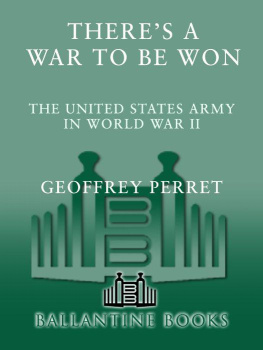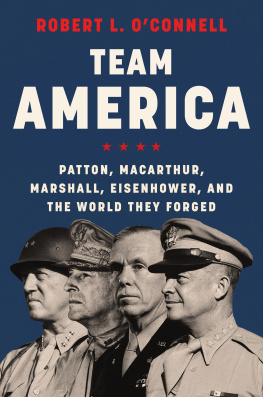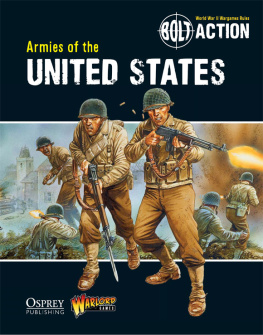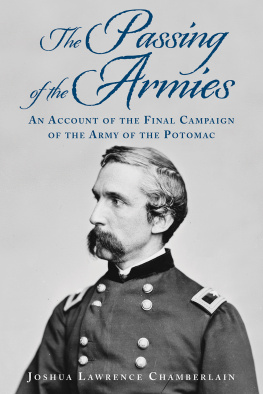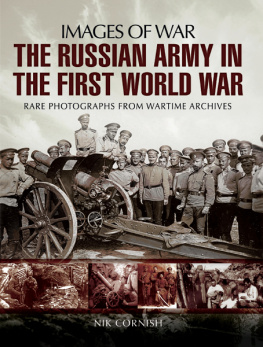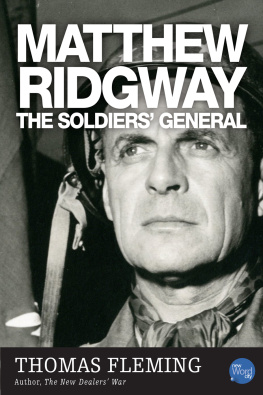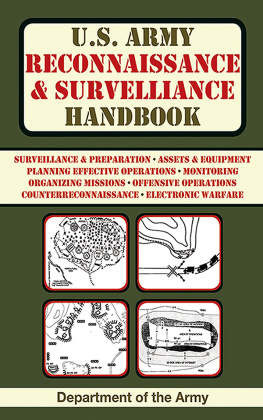More praise forTheres a War to Be Won
It is about time that someone wrote a book that really tells the in-depth story of the U.S. Armys central role in winning World War II. In contrast to nearly all other accounts, Geoffrey Perret tells far more than merely what happened on the battlefield, important as that is; he tells why it happened, what characteristics of the Army, seeds planted as far back as the First World War, caused its members to perform as well, sometimes as poorly, as they did. Having been exposed to the Army for my whole lifeI was a child of the Army of the 1930sI have always presumed that I possessed some expertise on what made it function. Perret has shown me how shallow my information was, how little I really understood of the real, behind-the-scenes accomplishments of people I thought I knew well. Theres a War to Be Won is a book long overdue.
John S. D. Eisenhower
Somehow Perret has managed to accomplish two rather amazing feats first, he makes the U.S. Armys role in World War II as exciting as the naval battles and the air action; and, second, his work is both lively and authoritative, a rare blend in historical writing
D. Clayton James, Ph.D.
John Biggs Professor of Military History
Virginia Military Institute
Author of The Years of MacArthur
Very impressive and well written. The author has done a fine job of compressing a tremendous amount of information into a readable, fast-paced narrative. He has covered just about all aspects of the warmany omitted in other general worksand woven them together skillfully.
Stanley L. Falk
Former Chief Historian
United States Air Force
A proud and ringing statement Fond and moving A classic. It should make all Americans proud that we produce such men and women, and want our children to know who they were and what they did. They deserve it.
The Tampa Tribune
[A] humane and absorbing account [A] spirited reconstruction of the period.
New York Newsday
You will enjoy the books engrossing, sort of you-are-there narrative that cuts across just about every facet about the Army during the war. The profiles of Ike, Bradley, and Patton are page turners. There is much history here, easy to read material, and its all so well presented. This book is a keeper and greatly recommended.
Chattanooga News-Free Press
The fighting man, Perrets book serves to remind us, was (and is now, for that matter) most frequently on the issuing and receiving end of one-round-at-a-time weaponry; he (and nowadays, she) was usually quite dirty, often muddy, always exhausted, sometimes inspired, courageous, even brilliant under difficult, often impossible conditions and sometimes questionable leadership. The books strength lies in the dramatic tension it brings to the politics of warfare.
Chicago Tribune
A solidly researched, even-handed Sherman tank of a book, bulging with information and ideas about how and why the U.S. Army achieved such remarkable success Perrets big book is a lasting tribute to what he considers the greatest army of all time.
Milwaukee Journal
This is a great book. It is the best single source I have found for the Armys story in World War II.
Lt. Col Roger Cirillo
Army
ALSO BY GEOFFREY PERRET
Nonfiction
DAYS OF SADNESS, YEARS OF TRIUMPH
A DREAM OF GREATNESS
AMERICA IN THE TWENTIES
A COUNTRY MADE BY WAR
Fiction
EXECUTIVE PRIVILEGE
Published by Ballantine Books
Copyright 1991 by Geoffrey Perret
Maps Copyright 1991 by Anita Karl/Jim Kemp
All rights reserved under International and Pan-American Copyright Conventions. Published in the United States by Ballantine Books, a division of Random House, Inc., New York, and simultaneously in Canada by Random House of Canada Limited, Toronto.
http://www.randomhouse.com
Library of Congress Catalog Card Number: 97-93475
eISBN: 978-0-307-80140-1
This edition published by arrangement with Random House, Inc.
v3.1
TO BOB AND CAROL HOPPER ,
WITHOUT WHOSE FRIENDSHIP
AND BASEMENT
THIS BOOK MIGHT NOT HAVE BEEN POSSIBLE .
Acknowledgments
One of the most agreeable features of writing on the wartime Army is meeting the archivists and librarians who steer the erstwhile researcher through the maze of records. They are among the nicest, most dedicated people anywhere, and without them history would be a lot more fiction than fact.
My greatest debt beyond any doubt is to the U.S. Army Military History Institute, at Carlisle Barracks, Pennsylvania. There, largely under the inspiration of Dr. Richard J. Sommers, a major modern archive has come into existence in the space of only twenty years. This is an extraordinary achievement, and one for which scholars yet unborn will be giving thanks far into the twenty-first century. Dr. Sommers and his able assistant, David Keough, have put me deeply in their debt and I am happy to acknowledge that.
I was aided too by Judith Sibley and Alan Aimone, of Special Collections at the library at West Point; by Herb Pakrantz at the Eisenhower Library in Abilene; by Bill Massa, of the Manuscripts and Archives Division of Sterling Memorial Library at Yale; by Ron Grele of the Oral History Office, Butler Library, Columbia University; by Mary Beth Gamble of the library at the National War College in Washington; by Larry Bland and John Jacobs at the George C. Marshall Foundation in Lexington, Virginia; by Edward Reese at the National Archives; and by the staffs of the Library of Congress in Washington, the University of California at Berkeley, and the Hoover Institution at Stanford University.
I have benefited immeasurably from the close attention that Dr. Forrest C. Pogue gave to my manuscript and from the long, stimulating discussions we had over several years about the wartime Army. His unrivaled knowledge is surpassed only by his charm and kindness.
When the manuscript was nearly complete two other distinguished military historians kindly agreed to read it for accuracy: Martin Blumenson and Stanley Falk. I count myself fortunate indeed in having the benefit of their advice; my debt to them is considerable and gratefully acknowledged.
The other great benefactor of this work has been my editor, Robert D. Loomis. This would be a much poorer book without his uncanny ability to detect the flawed, the incomplete, the misleading, the badly phrased. It must be a gift, like perfect pitch. Whatever it is, hes got it and I couldnt be more grateful, or luckier.
Contents
NORTH AFRICA AND SOUTHERN EUROPE


NEW GUINEA, SOLOMONS AND THE CENTRAL PACIFIC AREA


CHINA-BURMA-INDIA THEATER


